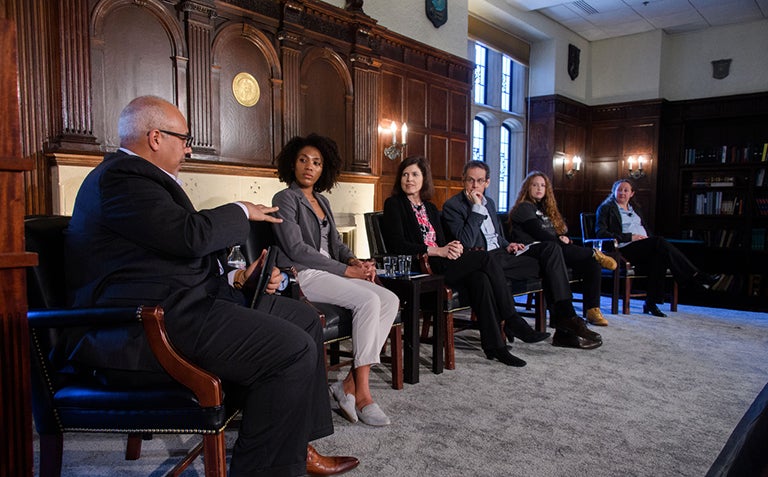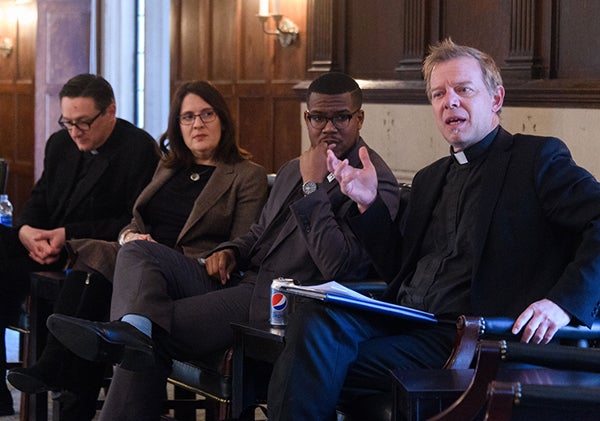Title: University Joins Conversations on Social Movements, Gun Violence
Georgetown convenes conversations with its scholars, student leaders and members of the faith community on social movements and gun violence the day before the March for Our Lives event.

–Georgetown convened conversations with its scholars, student leaders and members of the faith community on social movements and gun violence the day before more than half a million people are expected to address the latter issue during today’s March for Our Lives event.
The march, planned by survivors of the Feb. 14 school shooting in Parkland, Florida, will rally near the White House today.
No matter what the subject, “the most important factor that differentiates winning movements from the rest are the grassroots how they mobilize and organize and work city by city, state by state to move the country closer to their ideal,” said Leslie Crutchfield, executive director of Global Social Enterprise Initiative at Georgetown during a panel discussion yesterday.
Making Movements Successful
Crutchfield, who wrote How Change Happens: Why Some Movements Succeed While Others Don’t (Wiley, 2018), participated in the panel with Leticia Bode, assistant professor of communication, culture and technology at Georgetown.
Other panelists included alumna Colleen Roberts (C’15), who has worked with Black Lives Matter and with community activists in Ferguson, Missouri; student leader Sarah Clements (C’18), who became a gun violence activist after her mother survived the school shooting in Newtown, Connecticut; and Georgetown Law professor David Cole, national legal director for the American Civil Liberties Union (ACLU).
Mo Elleithee, executive director of Georgetown’s Institute of Politics and Public Service, moderated the panel.
“If you look through the political prism at the last 10 years or so, the two social movements that have had the most impact and actually have effected political change are the NRA and the Tea Party,” Elleithee said. “On the consciousness side, you have MeToo, Black Lives Matter, [and] you’ve got the moment we’re in now that’s being manifested by this march.”
Growing Supporters
When the shootings at Sandy Hook Elementary in Newtown occurred in 2012, Crutchfield said the largest gun control campaign was the Brady Campaign, which had about 500,000 members compared to the nearly 5 million members of the National Rifle Association.
“After Sandy Hook, when Shannon Watts, the founder of Moms Demand Action, merged up with Mayor Bloomberg’s Mayors Against Illegal Guns to create Everytown, it’s only been in the last three years that that group has grown to have more than 4 million supporters,” Crutchfield said.
The panelists also talked about how movements now seek to influence the private sector in addition to government.
“It’s not a new strategy, it’s another target that organizations can use to try to influence,” said Bode, whose book Social Media Shaped the 2016 Presidential Campaign is expected to be released next year. “So, if you’re not seeing the ability to put pressure on a government organization, you can go to private organizations.”
Creating Hope
Boycott NRA resulted in the fastest movement of corporations pulling support from the gun lobby that she’s ever seen, she explained.
“Corporations who were late to that game actually got called out for taking too long, and that to me is an interesting shift that technology has changed the speed at which this happens,” she added.
Cole, thethe George J. Mitchell Professor in Law and Public Policy at Georgetown Law, closed with a sentiment about the hope social movements give that he expressed in his most recent book, Engines of Liberty: The Power of Citizen Activists to Make Constitutional Law (Basic Books, 2018).
“The notion is that you are not born with the DNA for hope, nor are you born with the DNA for apathy or fatalism,” said Cole. “It is not that hope causes people to act. It is the other way around. If we act, we create hope, and it’s also true that if we sit back and spectate, we create fatalism.”
The O’Neill Institute for National and Global Health Law at Georgetown Law will present a panel discussion on Gun Violence: Public Health & the Second AmendmentMarch 26 at 5:30 p.m. at the Georgetown Law Campus. A student from Marjory Stoneman Douglas High School will be among the panelists.
Continuing Dialogue

Rev. Bryant Oskvig, director of Protestant ministry, Rabbi Rachel Gartner, director of Jewish Life; and Rev. Brandon Harris, Protestant chaplain for the Law Center listen as Rev. Greg Schenden, S.J., Catholic chaplain, speaks.
An earlier Friday panel explored the roles of the faith community in the fight against gun violence.
Rev. Bryant Oskvig, director of Protestant ministry, moderated the discussion, which featured Rabbi Rachel Gartner, director of Jewish Life; Rev. Brandon Harris, Protestant chaplain for the Law Center; and Rev. Greg Schenden, S.J., Catholic chaplain.
Schenden said one of the cornerstones of Ignatian tradition is the spiritual exercises, where each person is recognized as a child of God when engaged in dialogue.
“We’re not able to engage in authentic dialogue in so many places, in our church, and most certainly not in our culture,” Schenden said. “All too often engaging in dialogue becomes about debate, but dialogue involves both speaking and listening.”